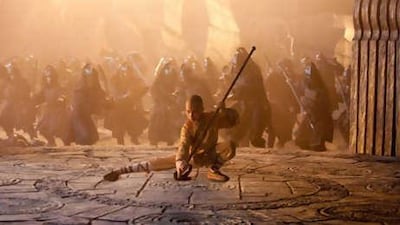The Last Airbender: Director: M Night Shyamalan. Starring: Dev Patel, Noah Ringer, Nicola Peltz There are, it seems, two types of modern bad movies. There are the noisy, inane and low-brow films that are designed only to brutalise the viewer into meek submission. See Transformers, The A-Team, or even Iron Man 2. Or there are movies such as The Last Airbender - films that are so witless and so ill-conceived that they stand a very good chance, in perhaps less than a decade, of becoming contemporary kitsch classics.
For there is nothing offensive or bullish about The Last Airbender, the latest in a series of increasingly misfired works (see The Happening, Lady in the Water) for the former wunderkind director M Night Shyamalan (The Sixth Sense). No, as a film it is quite simply laughably bad. Let's start with the concept. The film is adapted by Shyamalan from a popular kids' cartoon series about a world full of preternaturally gifted "benders" - beings that can control, depending on their tribe, the four elements of fire, water, earth and air, and fling them about at will. Naturally, this world is at war, with the fire-benders occupying the position of chief villains, led here by the angry Prince Zuko (Dev Patel), while only one remaining air-bender, here called Aang (Noah Ringer), is left alive to save mankind. Thus, much of the movie, if not all of the action, is taken up with increasingly tedious battles between the various benders who, in an elaborate game of scissors-paper-stone, try to outclass each other with the quantities and forms of their hurled and tossed elements - ice versus fire, water versus air, and so on.
And yet it quickly becomes apparent that although this may have been engrossing in an overdrawn kids' cartoon, on screen it raises a lot of difficult questions. Namely, why are these skills considered special, even useful? In one scene Zuko orders his men to "torch the village" - which requires elaborate martial arts moves, and the conjuring of flames from the abyss, when a box of matches would have sufficed. Similarly, the lead heroine, Katara (Nicola Peltz), flings tiny quantities of water through the air, with great physical effort, when a humble bucket, or even a cup, would have been far more effective. The benders, it quickly transpires, have the worst super-skills in movie history.
Even if you ignore this flaw, the plot is hardly a compensation. Here Zuko needs to kidnap and present Aang as a trophy to his angry father Ozai (Cliff Curtis), but not until he's battled Katara and her brother Sokka (Jackson Rathbone) in a deadly bout of, well, throwing stuff at each other. The performances are uniformly poor. Even Slumdog Millionaire's estimable Patel struggles with lines such as, "You are my prisoner, Airbender!" The film takes a shot at spiritual transcendence near the end that falls on its face. But mostly it is far too concerned with setting up a sequel to be focused on narrative resolution or emotional satisfaction. On the basis of this, however, I wouldn't hold my breath for The Last Airbender II.

